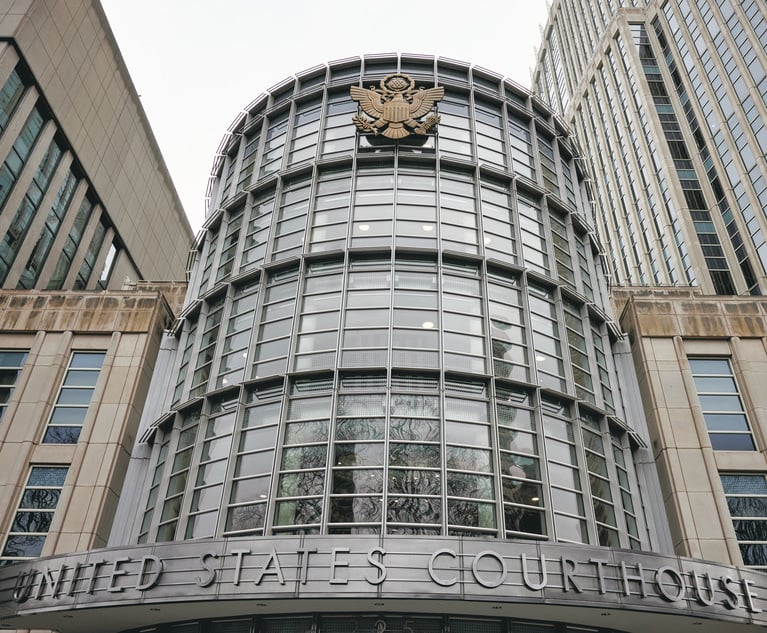 Hofstra University.
Hofstra University.2nd Circuit Revives Ex-Hofstra Tennis Coach's Suit Linking Firing to Anti-Male Gender Bias
A three-judge panel of the appeals court ruled that U.S. District Judge Denis R. Hurley's decision last year to dismiss the case in the Eastern District of New York rested on improper factual findings and conflicted with Second Circuit precedent setting a more relaxed standard for plaintiffs challenging university procedures dealing with allegations of sexual misconduct.
August 15, 2019 at 06:14 PM
4 minute read
The U.S. Court of Appeals for the Second Circuit on Thursday revived a discrimination lawsuit by the former director of Hofstra University’s tennis program, who claimed he was fired as the result of false allegations of sexual harassment from a female player.
A three-judge panel of the appeals court ruled that U.S. District Judge Denis R. Hurley’s decision last year to dismiss the case in the Eastern District of New York rested on improper factual findings and conflicted with Second Circuit precedent setting a more relaxed standard for plaintiffs challenging university procedures dealing with allegations of sexual misconduct.
Writing for the court, Judge José A. Cabranes of the U.S. Court of Appeals for the Second Circuit said Hurley had placed “several unwarranted limitations” on the Second Circuit’s 2016 ruling in Doe v. Columbia, which held that “procedural deficiencies” in a university’s handling of sexual assault claims against a male student supported an inference of gender bias.
According to Cabranes, the decision applied equally to cases involving allegations of sexual assault and sexual harassment, and it could not be interpreted to apply only to students and not to university employees.
“Here, Menaker has clearly alleged that he suffered an adverse employment action, and that this action came in response to accusations (if not an actual finding) of sexual harassment,” Cabranes wrote in a 34-page opinion. “Similarly, Menaker has plausibly alleged facts that suggest at least some pressure on Hofstra to react more forcefully to allegations of male sexual misconduct.”
The lawsuit, filed by Jeffrey Menaker, was the latest in a series of cases to target colleges and universities, as they face increasing pressure to react more forcefully to allegations of male sexual misconduct.
The U.S. Department of Education in 2011 required schools to take a more rigorous approach to such claims and adopt a lower burden of proof when adjudicating claims of sexual misconduct. According to the opinion, Hofstra itself was under investigation in 2015 for failing to comply with the mandate and faced internal criticism for not responding strongly enough to sexual misconduct on campus.
Menaker, who coached both the men’s and women’s varsity tennis teams at Hofstra, claimed he was the subject of a malicious allegation from a student-athlete who allegedly told school officials that Menaker was “obsessed” with her menstrual cycle and made inappropriate comments to female athletes.
The student-athlete, who played for the university from 2015 to 2019, was not a party to the lawsuit and could not be reached Thursday afternoon for comment. An attorney for Hofstra did not immediately respond to an email requesting a comment on her behalf.
Menaker has denied the student-athlete’s allegations and said in his lawsuit that Hofstra was too quick to fire him following a bungled investigation of her claims.
In his ruling, Cabranes said multiple “irregularities” with the school’s investigation that supported Menaker’s claims that his termination was motivated, at least in part, by gender. For instance, Cabranes cited allegations from Menaker’s complaint, which claimed Hofstra failed to interview key witnesses and follow its own written harassment policy.
Those allegations, Cabranes said, must be taken as true at the dismissal stage, and he faulted Hurley for reaching conclusions beyond the facts alleged in the complaint. His ruling did not reach the underlying merits of Menaker’s claims.
Jill Rosenberg, an attorney for Hofstra, said in a statement that she was “confident that Hofstra’s actions and decisions will be upheld once the merits of this matter are considered in the lower court.”
“We look forward to demonstrating there was no discrimination in the university’s actions,” said Rosenberg, a partner with Orrick, Herrington & Sutcliffe.
Stephen D. Houck, an Offit Kurman attorney who represented Menaker, declined to comment on the ruling.
The case, filed in Brooklyn federal court, is captioned Menaker v. Hofstra University.
Read More:
This content has been archived. It is available through our partners, LexisNexis® and Bloomberg Law.
To view this content, please continue to their sites.
Not a Lexis Subscriber?
Subscribe Now
Not a Bloomberg Law Subscriber?
Subscribe Now
NOT FOR REPRINT
© 2025 ALM Global, LLC, All Rights Reserved. Request academic re-use from www.copyright.com. All other uses, submit a request to [email protected]. For more information visit Asset & Logo Licensing.
You Might Like
View All
NY Appellate Panel Cites Student's Disciplinary History While Sending Negligence Claim Against School District to Trial

'No Evidence'?: Big Law Firms Defend Academic Publishers in EDNY Antitrust Case
3 minute read
'Substantive Deficiencies': Judge Grants Big Law Motion Dismissing Ivy League Price-Fixing Claims
3 minute read
Lippman Study on Antisemitism at CUNY Weighs Free Speech, Unprotected Acts
Trending Stories
- 1You Too Can Be a Programmer: Connecting to Legal Platform APIs With Generative AI (Part 2)
- 2Court of Appeals and Appellate Division As Courts of First Instance
- 3Federal Judge Slaps Down the SEC’s Attempt to Regulate Crypto Liquidity Providers
- 4A Client Is Guilty; But Another Man Is Wrongfully Convicted
- 5Legal Tech's Predictions for Cybersecurity in 2025
Who Got The Work
Michael G. Bongiorno, Andrew Scott Dulberg and Elizabeth E. Driscoll from Wilmer Cutler Pickering Hale and Dorr have stepped in to represent Symbotic Inc., an A.I.-enabled technology platform that focuses on increasing supply chain efficiency, and other defendants in a pending shareholder derivative lawsuit. The case, filed Oct. 2 in Massachusetts District Court by the Brown Law Firm on behalf of Stephen Austen, accuses certain officers and directors of misleading investors in regard to Symbotic's potential for margin growth by failing to disclose that the company was not equipped to timely deploy its systems or manage expenses through project delays. The case, assigned to U.S. District Judge Nathaniel M. Gorton, is 1:24-cv-12522, Austen v. Cohen et al.
Who Got The Work
Edmund Polubinski and Marie Killmond of Davis Polk & Wardwell have entered appearances for data platform software development company MongoDB and other defendants in a pending shareholder derivative lawsuit. The action, filed Oct. 7 in New York Southern District Court by the Brown Law Firm, accuses the company's directors and/or officers of falsely expressing confidence in the company’s restructuring of its sales incentive plan and downplaying the severity of decreases in its upfront commitments. The case is 1:24-cv-07594, Roy v. Ittycheria et al.
Who Got The Work
Amy O. Bruchs and Kurt F. Ellison of Michael Best & Friedrich have entered appearances for Epic Systems Corp. in a pending employment discrimination lawsuit. The suit was filed Sept. 7 in Wisconsin Western District Court by Levine Eisberner LLC and Siri & Glimstad on behalf of a project manager who claims that he was wrongfully terminated after applying for a religious exemption to the defendant's COVID-19 vaccine mandate. The case, assigned to U.S. Magistrate Judge Anita Marie Boor, is 3:24-cv-00630, Secker, Nathan v. Epic Systems Corporation.
Who Got The Work
David X. Sullivan, Thomas J. Finn and Gregory A. Hall from McCarter & English have entered appearances for Sunrun Installation Services in a pending civil rights lawsuit. The complaint was filed Sept. 4 in Connecticut District Court by attorney Robert M. Berke on behalf of former employee George Edward Steins, who was arrested and charged with employing an unregistered home improvement salesperson. The complaint alleges that had Sunrun informed the Connecticut Department of Consumer Protection that the plaintiff's employment had ended in 2017 and that he no longer held Sunrun's home improvement contractor license, he would not have been hit with charges, which were dismissed in May 2024. The case, assigned to U.S. District Judge Jeffrey A. Meyer, is 3:24-cv-01423, Steins v. Sunrun, Inc. et al.
Who Got The Work
Greenberg Traurig shareholder Joshua L. Raskin has entered an appearance for boohoo.com UK Ltd. in a pending patent infringement lawsuit. The suit, filed Sept. 3 in Texas Eastern District Court by Rozier Hardt McDonough on behalf of Alto Dynamics, asserts five patents related to an online shopping platform. The case, assigned to U.S. District Judge Rodney Gilstrap, is 2:24-cv-00719, Alto Dynamics, LLC v. boohoo.com UK Limited.
Featured Firms
Law Offices of Gary Martin Hays & Associates, P.C.
(470) 294-1674
Law Offices of Mark E. Salomone
(857) 444-6468
Smith & Hassler
(713) 739-1250






